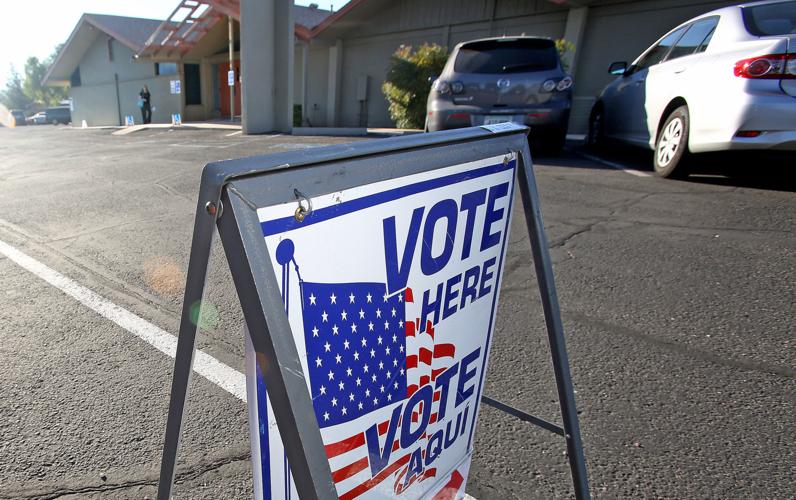If voters reject Prop. 409, the proposed salary increases for the Tucson City Council and the mayor in Tuesday’s election, one thing is for sure — it will be back on the ballot in a few years.
The inevitability of another ballot question for pay raises is written in the Tucson city charter.
It requires that every two years, a nonpartisan commission review the elected officials’ salaries and make a recommendation on whether to increase their take-home pay, which has to be approved by voters. The measure and its predecessors have repeatedly failed at the polls, but absent a charter change that review will continue every two years.
The last raise came in 1999, bringing the salary of the mayor to $42,000 and individual council member to $24,000 a year.
A review of city salary data show this often makes the council members the lowest paid full-time employee in their ward offices.
Prop. 409 is asking voters to increase the mayor’s salary to roughly $63,000 a year and increase council members’ salaries to just over $42,000 per year.
A recent survey of council members show the job has evolved and it is no longer a part-time position requiring only a handful of official functions. Several council members said they often work more than 40-hour weeks on council responsibilities.
The charter amendment to increase salaries for the mayor and council members isn’t as sexy a topic as the other ballot initiative, the controversial “sanctuary city” Prop. 205.
There are a total of 20 arguments for and against filling up nine pages of the city’s official voter guide on the ballot initiative to make Tucson the state’s first “sanctuary city.” There is not a single argument for or against Prop. 409 in the guide.
That doesn’t mean there are no supporters for giving the mayor and council raises.
Former Tucson City Councilwoman Karin Uhlich and Charlene Mendoza, a city resident involved in several local boards, wrote in an op-ed in the Arizona Daily Star that residents get what they pay for when it comes to candidates for public office.
“After two decades, it’s time to raise the salaries paid to our mayor and city council members,” the pair wrote. “Current salary levels, $42,000 for mayor and $24,000 for city council members, make it virtually impossible to recruit qualified, competent candidates who truly reflect the beautiful diversity of Tucson.”
Pima County GOP complain about city ballots
The chairman of the Pima County Republican Party fired off a letter last week to the city of Tucson, complaining that the ballots sent to voters disclosed their party affiliation in the mailings’ clear address windows.
David Eppihimer said while there was no evidence of voter suppression, he worried that Republican ballots could be lost.
“I’m not making any accusations that any of these errors by your office have actually resulted in vote fraud or suppression. Nonetheless, the opportunities are there and the appearances of impropriety are abundant,” wrote Eppihimer.
He threatened the city with legal action if there is any evidence of ballot tampering.
“Lastly, if evidence is brought to light post election that these errors resulted in vote suppression or fraud, the Pima GOP reserves the right to seek every legal remedy available to nullify the results of the Nov. 5, 2019, General Election, including any and all propositions or other measures voted on at that time,” Eppihimer said.
City Clerk Roger Randolph said there are procedures in place to track ballots but said he would look into the issue of what is displayed in the ballot mailings before the next election.
Eppihimer said the local GOP is organizing volunteers to be political observers for Tuesday’s election, going to various sites where ballots are processed.
Oro valley Council members spar over appointments
Just two weeks after the Oro Valley town council reached a long-debated compromise on the town-owned golf courses, the split council almost immediately became divided again — this time over liaison appointments.
Mayor Joseph Winfield and Vice Mayor Melanie Barrett proposed sweeping changes during the Oct. 16 meeting to the council members’ roles on various town boards, including planning and zoning, parks and recreation, and budget and finance. Council members serve as board liaisons, providing input on council policies, and taking the discussion back to the full council.
The proposed changes didn’t sit well with Rhonda Pina, Steve Solomon, and Bill Rodman, the three remaining members of what’s referred to as the “Old Council,” or those elected before 2018. They said they weren’t upset with the appointments, but they were upset with how and why they were done, criticizing Winfield for politicizing something trivial, a lack of transparency, and making a decision before term appointments ended at the end of the year. They said they found out when the agenda was posted.
“In this case, not even a courtesy phone call was made to a fellow council member,” Solomon said. “Be upfront. Be honest about it for once what you’re doing. Don’t sit there and go through a whole charade of why this is happening.”
“I don’t know why we are deciding we should change this on Oct. 16. If I’ve done something to get fired, I need to know what that is?” Rodman said, referring to it as a “power play.”
“It’s that common courtesy that you would think would happen among council members,” Pina said. “It really felt like did we take a step back here. ... Why now? It looks suspicious. It really, really does.”
For Winfield, he said the proposal was made because of his recent professional retirement, freeing him up to focus more on his mayoral role.
He said he was instructed to propose the changes in the agenda at the urging of the town attorney, who confirmed that he told Winfield that otherwise could have been a violation of open meetings law.
Nearly 45 minutes of discussion later, it came to a 3-3 vote, leaving the positions unchanged.





